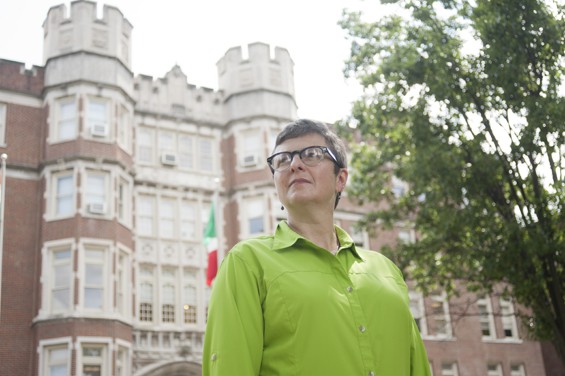She quit Webster's academic subcomittee for the Human Rights Program for just that reason. "I can't afford to go to meetings for free anymore," she states flatly. In fact, thanks to her four-day-a-week job at Trader Joe's, she couldn't attend many meetings of her fellow adjunct professors as they contemplated unionizing.
She even missed the Webster adjunct faculty vote at the National Labor Relations Board on May 11, though she would have liked to have been there. She was too busy stocking bananas.
In recent years, American universities, both public and private, have become the Walmart of education. Anti-union CEOs from the likes of Peabody Energy and Emerson Electric sit on their board of trustees; their presidents and chancellors in turn sit on the CEO's corporate boards. Yet universities pay the people doing most of the work — in this case, the actual teachers — non-livable wages.
Even as administrators' salaries have grown exponentially, so too has the percentage of college-level instructors who are part-time adjuncts. In 1975, 43 percent of U.S. college instructors were adjuncts or contingent workers, according to the American Association of University Professors. By 2011, that figure had climbed to 70 percent.
If you have attended college this century, chances are many of your professors were living in poverty. Adjuncts are the lowest wage earners in universities, making less than janitors and food service workers. The median pay per course for an adjunct in the U.S. is $2,700, according to the AAUP.
So it's not surprising that the Integrated Public Use Microdata Series, a project that analyzes census data, found that 31 percent of part-time faculty live near or below the poverty line. A recent report from UC Berkeley suggests that 25 percent of all U.S. adjunct professors receive public assistance such as Medicaid or food stamps, costing taxpayers $468 million.
In contrast, university presidents, chancellors and provosts have never done better. The median compensation for a public university president, according to Forbes, is $478,896. The median compensation for a private university chancellor is $627,750 — and numbers soar much higher at some schools. According to The Chronicle of Higher Education, Rensselaer Polytechnic institute paid its president $7.1 million in 2012.
University adjunct faculty are now attempting to unionize across the country, some more successfully than others. It's part of a national push by the Service Employees International Union, or SEIU, which has become a powerhouse by organizing workers far outside labor's traditional manufacturing bases — healthcare staffers, janitors, civil servants.
For the last three years, SEIU's Adjunct Action campaign has crusaded for part-time university instructors in cities from Boston to Los Angeles, an effort that continues to gather steam. Adjuncts at universities including Tufts, Northeastern, Georgetown, American University, Boston University and Lesley universities have successfully unionized through the Adjunct Action campaign. SEIU's most recently negotiated contract, at Tufts, guarantees that an adjunct must make at least $7,300 per course by September 2016. The contract also provides for two- and three-year contracts instead of the usual semester-to-semester assignments.
Some of the union's most ferocious battles have taken place right here in St. Louis — including at Washington University, where adjuncts voted in January to join SEIU by a vote of 138 to 111.
One of those "yes" votes came from Chris Boehm. Since 2011, Boehm has taught as an adjunct in Wash. U.'s English department, where he received his doctoral degree.
(And, in the interest of full disclosure, another came from me. I currently teach creative writing at Washington University and have also taught writing and literature at St. Louis Community College, the University of Missouri-St. Louis and St. Louis College of Pharmacy, sometimes at all four places in one semester in order to pay the bills.)
"Collective action is the only way to counteract systemic exploitation," says Boehm, "and I don't know how to phrase what is happening to adjuncts better than systemic exploitation."
The Wash. U. vote came after almost a year of organizing, planning, knocking on doors, emails, rallies and meetings. Boehm plays blistering guitar in a swamp rock band and boasts a backwoods chin beard to match, but he speaks like a tactician as well as an impassioned organizer.
"When only 25 to 30 percent of the teaching labor on college campuses is full-time/tenure track, then not being able to nail down a full-time job has less to do with merit, and more to do with conditions manufactured by administrations so that they can exploit a cheap pool of labor," he says.
After the Washington University campaign, Boehm took a part-time job with SEIU organizing on other campuses: "They needed part-time help, and, being an adjunct, I needed more part-time work to make ends meet."
Boehm's new job put him on the frontlines of a campaign that ended up being even harder fought — the fight to unionize adjuncts at neighboring Webster University.
Next: Inside the Webster campaign


